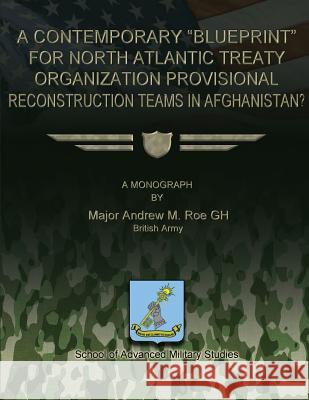A Contemporary "Blueprint" for North Atlantic Treaty Organization Provisional Reconstruction Teams in Afghanistan? » książka
A Contemporary "Blueprint" for North Atlantic Treaty Organization Provisional Reconstruction Teams in Afghanistan?
ISBN-13: 9781479183050 / Angielski / Miękka / 2012 / 74 str.
A Contemporary "Blueprint" for North Atlantic Treaty Organization Provisional Reconstruction Teams in Afghanistan?
ISBN-13: 9781479183050 / Angielski / Miękka / 2012 / 74 str.
(netto: 49,24 VAT: 5%)
Najniższa cena z 30 dni: 51,99
ok. 16-18 dni roboczych
Bez gwarancji dostawy przed świętami
Darmowa dostawa!
The coalition and North Atlantic Treaty Organization (NATO) face a complex and difficult challenge in their search for solutions to the Afghan conundrum. The establishment of Provisional Reconstruction Teams (PRTs) represents a revolutionary step in meeting this challenge. The PRT program combines security and civil action to facilitate regional development. PRTs afford an important interface and make possible information sharing among the local population and government, non-government and international aid organizations. Despite their diminutive size, PRTs possess an innate ability to influence a significant proportion of Afghanistan's rural population, thereby reinforcing regional stability. Notwithstanding common agendas, significant variances exist between coalition and NATO PRTs. Inconsistencies in modus operandi, perceived mandates, roles and responsibilities, national caveats and operational structures have all faced criticism. With international pressure mounting for the International Security Assistance Force (ISAF) to take the lead throughout Afghanistan, this study of existing PRTs is not only timely, but provides a constructive insight for those nations contemplating supporting the reconstruction effort. This investigation is also useful to those nations who staff existing PRTs in the north and northwest and who may be considering transferring their efforts to the southern or southeastern regions; the most insecure and challenging areas of Afghanistan. This monograph provides a historical overview of Afghanistan's recent history, reviews the contemporary causes of internal instability, illustrates the international response, and analyses three existing approaches to PRTs: those of the United Kingdom, Germany and the United States. It also identifies and evaluates a number of PRT tactical and operational lessons learned. The monograph concludes by combining the pertinent lessons learned into a recommended PRT "blueprint" to meet the contemporary and evolving challenges of provincial security and reconstruction in Afghanistan
Zawartość książki może nie spełniać oczekiwań – reklamacje nie obejmują treści, która mogła nie być redakcyjnie ani merytorycznie opracowana.











